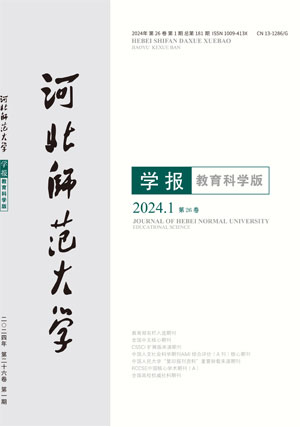期刊信息

- 刊名: 河北师范大学学报(教育科学版)Journal of Hebei Normal University (Educational Science Edition)
- 主办: 河北师范大学
- ISSN: 1009-413X
- CN: 13-1286/G
- 教育部名栏入选期刊
- 全国中文核心期刊
- CSSCI扩展版来源期刊
- AMI综合评价(A刊)核心期刊
- RCCSE中国核心学术期刊
- 全国高校特色栏目社科学报
- 中国人民大学“复印报刊资料”重要转载来源期刊
- 全国高校权威社科期刊
网络时代高等教育应注重传统文化的传承
-
作者单位:海南师范大学教育科学学院, 海南省海口 571158 -
起止页码:64 - 67页 -
DOI:
On the internet-based higher education and traditional heritage
摘要/Abstract
摘要:
网络信息传播的全球化让大学生在扩大知识视野的同时,也面临网络道德失范的问题。针对这个问题,大学应尽引领社会进步的责任,同时注重传统文化的传承,塑造大学生的网络人格,促进网络时代道德文明的发展、进步。
Abstract:
The online communities come into being due to the fast development of internet.The internet may help with globalization of information transmission,as well as the spread of moral disruption. This paper discusses the preventive measures in terms of social responsibility,traditional heritage,personality,and civilization.
关键词
参考文献 29
- [ 1 ] 第17次中国互联网络发展状况统计报告[EB/OL].http://digi.tech.qq.com/images/1213/1.doc,p.4.
- [ 2 ] 佚 名。大学生网络道德调查报告[EB/OL].http://www.4oa.com/bggw/sort02902/sort02952/231969.html
- [ 3 ] 马和民。新编教育社会学[M].上海:华东师范大学出版社,2002.
- [ 4 ] 张素玲。大学生网络道德调查分析[J].集美大学学报,2003,(3):66.
- [ 5 ] 刘志刚。当代大学生网络伦理危机探析[J].江苏大学学报(高教研究版),2005,(1):64-65.
- [ 6 ] 肖 一。高校是文化繁荣的生力军[N].光明日报,2008-03-13(5).
- [ 7 ] 王志萍。网络伦理虚拟与现实[J].人文杂志,2000,(3):32.
- [ 8 ] [美]吉恩·史蒂芬斯。计算机领域中的犯罪[J].青少年犯罪研究,1996,(10-11):74.
- [ 9 ] 张 彦。论网络犯罪的教育对策[J].苏公安专科学校学报,2001,(3):114.
- [ 10 ] 刘志刚。当代大学生网络伦理危机探析[J].江苏大学学报(高教研究版),2005,(1):67.[9] Krashen,S.The input hypothesis and its rivals[A].In N.Ellis(ed.),Implicit and explicit learning of languages[C].London:Academic Press,1994.45-77.
- [ 11 ] Mackey,A.,&J.Goo.Interaction in SLA:a research synthesis and meta-analysis[A].In A.Mackey(Ed.),Conversational interaction in second language acquisition:A collection of empirical studies[C].Oxford:Oxford UniversityPress,2007.407-452.
- [ 12 ] Lyster,R.& K.Saito.Oral corrective feedback in classroom SLA:A Meta-Analysis[J].Studies in Second Language Acquisition,2010,(32):265-302.
- [ 13 ] Mackey,A.Feedback,noticing,and second language development:an empirical study of L2classroom interaction[J].Applied Linguistics,2006,(27):405-430.
- [ 14 ] Kim,J.,&Z.Han.Recasts in communicative EFL classes:do teacher intent and learner interpretation overlap[A].In A.Mackey(ed.),Conversational interaction in second language acquisition:A collection of empirical studies[C]Oxford:Oxford University Press,2007.269-297.
- [ 15 ] Mackey,A.,S.Gass,& K.McDonough.How do learners perceive interactional feedback[J].Studies in Second Language Acquisition,2000,(22):471-497.
- [ 16 ] Mackey,A.,J.Philp,T.Egi,A.Fujii,& T.Tatsumi 2002.Individual differences in working memory,noticing of interactional feedback and L2development[A].In P.Robinson(ed.),Individual differences and instructed language learning[C].Philadelphia:John Benjamins:181-209.
- [ 17 ] Philp,J.Constraints on “noticing the gap”:Non-native speakers'noticing of recasts in NS-NNS interaction[J].Studies in Second Language Acquisition.2003,(25):99-126.
- [ 18 ] Egi,T.Recasts,learners'interpretations,and L2development[A].In A.Mackey(ed.),Conversational interaction in second language acquisition:Acollection of empirical studies[C].Oxford:Oxford University Press,2007.249-267.
- [ 19 ] 顾珊珊,王同顺。语言交互活动中的重铸反馈研究[J].中国外语,2009,(30):54-59.
- [ 20 ] Panova,I.,& R.Lyster.Patterns of corrective feedback and uptake in an adult ESL classroom[J].TESOL Quarterly,2002,(36):573-595.
- [ 21 ] Ammar,A.& N.Spada 2006.One size fits all?Recasts,prompts,and L2learning[J].Studies in Second Language Acquisition,28:543-574.
- [ 22 ] Ellis,R.,S.Loewen,& R.Erlam.Implicit and explicit corrective feedback and the acquisition of L2grammar[J].Studies in Second Language Acquisition,2006,(28):339-368.[22] Lyster,R.Differential effects of prompts and recasts in form-focused instruction[J].Studies in Second Language Acquisition,2004,(26):399-432.
- [ 23 ] Nicholas,H.,P.Lightbown,&N.Spada.Recasts as feedback to language learners[J].Language Learning,2001,(51):719-758.
- [ 24 ] Mackey,A.&S.Gass.Second language research:Methodology and design[M].Mahwah,NJ:Lawrence Erlbaum Associates.2005.
- [ 25 ] 文秋芳,俞洪亮,周维杰。应用语言学研究方法与论文写作[M].北京:外语教学与研究出版社,2004.
- [ 26 ] Havranek,GWhen is corrective feedback most likely to succeed[J].International Journal of Educational Research,2002,(37):255-270.
- [ 27 ] Sheen,Y.The effects of corrective feedback,language aptitude and learner attitudes on the acquisition of English articles [A].In A.Mackey(ed.),Conversational interaction in second language acquisition:A collection of empirical studies[C].Oxford:Oxford University Press,2007.301-322.
- [ 28 ] McDonough,K.Identifying the impact of negative feedback and learners'responses on ESL question development[J].Studies in Second Language Acquisition,2005,(27):79-103.[29] McDonough,K.Interactional feedback and the emergence of simple past activity verbs in L2English[A].In A.Mackey(ed.),Conversational interaction in second language acquisition: A collection of empirical studies[C].Oxford:Oxford University Press,2007.323-338.
- [ 29 ] Lyster,R.,&J.Izquierdo.Prompts versus recasts in dyadic interaction[J].Language Learning,2009,(59):126-145.
